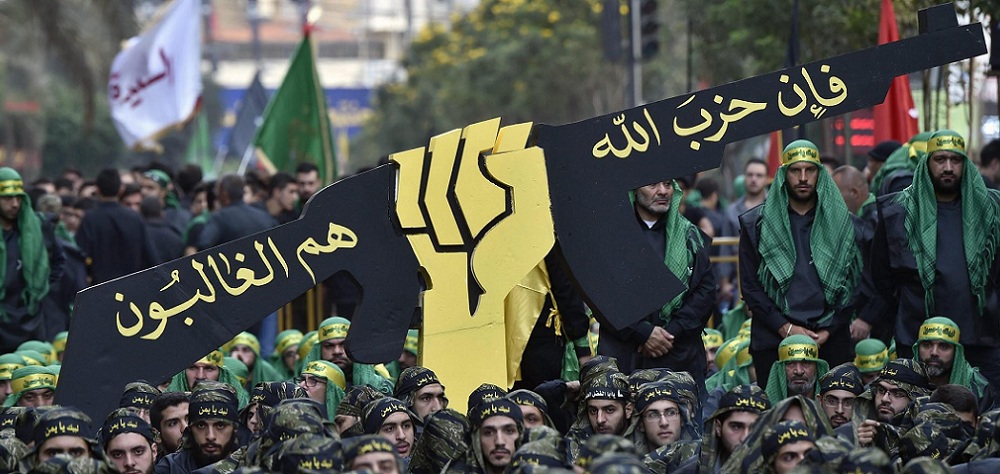Alwaght- The British government said on Friday it has added Lebanese Hezbollah on its terror blacklist. The HM Treasury said in a statement that under the Terrorism Financing Regulations, it has expanded the ban on Hezbollah to cover the political wing of the Lebanese resistant movement, with the immediate consequences being freezing the movement’s assets in Britain and limiting its fund-raising activities. The ban, also approved by the parliament, means that anyone who is a member of Hezbollah can face a potential punishment of 10 years in prison.
Before this move, London in 2001 and 2008 banned Hezbollah’s foreign security unit and military wing as terrorist entities. Now it has blacklisted its political wing. Now that Lebanon is grappling with the home political crisis and the tensions in the region are escalating between the US and the Iran-led Axis of Resistance in the Persian Gulf, Iraq, and Syria, Prime Minister Boris Johnson government’s policies show a deeper tendency to side with the American regional policies.
Hezbollah and Lebanon political crisis
Over the past three months, Lebanon has been engulfed by waves of popular protests against the deteriorating economic conditions, forcing Prime Minister Saad Hariri to step down from his post. The lack of consensus among the political groups over the formation of a new government has caused the important regional country to sink into a political crisis.
Lebanon is the juncture where various international actors’ interests meet, making the competition between the significant players directly affecting the Lebanese developments. Before the anti-government protests, the last year’s parliamentary election gave a majority to March 8 Alliance, which is allied to Hezbollah. This victory, which showed its influences on the country’s foreign policy especially Beirut stances on Syrian and Palestinian cases, rendered the Western countries and Saudi Arabia discontented with Hariri’s performance. Hezbollah and Foreign Minister Gebran Bassil, of the Christian Free Patriotic Movement, moved to facilitate the return of the Syrian refugees to their country in contrast to the Western and Israeli policy of painting Syria as a still crisis-hit country where war has not winded down yet. The two also opposed the Arab diplomatic normalization with the Israeli regime. When the protests began, the opposite side, backed by the West and Arab allies, pushed for a technocratic government to cut off Hezbollah's hand from the new cabinet. The pressures continue to mount on Hezbollah and the recent move by London, despite Hezbollah having three ministers in the cabinet, is meant to realize the movement’s isolation.
Post-Brexit Britain’s regional policy
The conservative government of Boris Johnson, which won the majority in the mid-December general elections, has announced that it will fully pull Britain out of the European Union by January’s end. The anti-Hezbollah measure is a London effort to take a path independent from the EU. The post-Brexit Britain foreign policy began to emerge under Jonson’s predecessor Theresa May. The new design of British foreign policy shows that London targets a bigger role in the West Asia region. To this end, the British leaders try to broaden their partnership with the region’s wealthy states like Saudi Arabia and the UAE, both of whom seek bigger Western military and security presence in the region.
Apparent enough, London sets its regional policies in line with those of Washington, particularly because Johnson is ideologically and politically close to the American President Donald Trump's mindset. So, London by blacklisting Hezbollah seeks to promote accordance with the US and some Arab regimes that take a tough stance on the Lebanese movement that in line with its allies in Iran, Syria, Iraq, Palestine, and Yemen stands in the face of the Israeli expansionism and Western projects
Zionist lobby and home competitions
From another aspect, the Zionist lobby’s role in determining London’s foreign policy lines should not be underestimated. During the election campaigns, one of the hot debate cases between Johnson and his rival Jeremy Corbyn of Labor Party, who is known for his anti-Israeli stances, was Hezbollah. During the competition, the Zionist lobby launched massive blackening propaganda against Corbyn introducing him as anti-Semitic. Now that Johnson made a surprise victory, he is returning the pro-Israeli lobby’s favor by banning Hezbollah.
Tel Aviv, now finding itself unable to face Hezbollah militarily, is setting the heart on the Western meddling to hamper Hezbollah’s increasing power gain. Last year, the Jewish Institute for National Security of America admitted Hezbollah’s military and deterrence capabilities saying that Hezbollah has more firepower than 95 percent of the world’s conventional militaries. Israeli sources repeatedly admitted that Tel Aviv cannot counter missiles fired from Lebanon or Syria in case of war in its northern front. They state that the Iron Dome and Arrow air defenses cannot detect the rockets that would be fired into the occupied territories should a war break out.



























